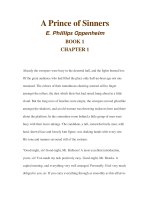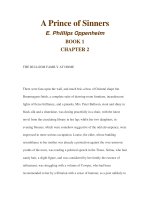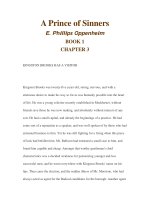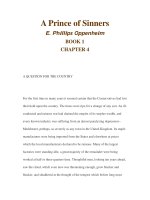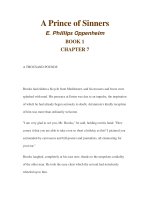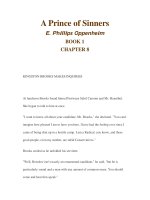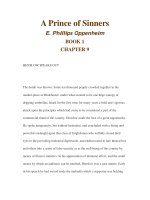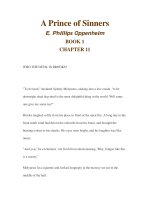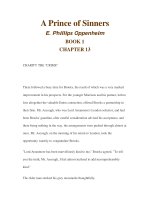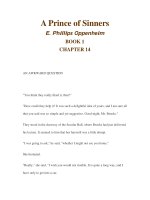A Prince of Sinners E. Phillips Oppenheim BOOK 1 CHAPTER 3 pdf
Bạn đang xem bản rút gọn của tài liệu. Xem và tải ngay bản đầy đủ của tài liệu tại đây (28.97 KB, 11 trang )
A Prince of Sinners
E. Phillips Oppenheim
BOOK 1
CHAPTER 3
KINGSTON BROOKS HAS A VISITOR
Kingston Brooks was twenty-five years old, strong, nervous, and with a
strenuous desire to make his way so far as was humanly possible into the heart
of life. He was a young solicitor recently established in Medchester, without
friends save those he was now making, and absolutely without interest of any
sort. He had a small capital, and already the beginnings of a practice. He had
some sort of a reputation as a speaker, and was well spoken of by those who had
entrusted business to him. Yet he was still fighting for a living when this piece
of luck had befallen him. Mr. Bullsom had entrusted a small case to him, and
found him capable and cheap. Amongst that worthy gentleman's chief
characteristics was a decided weakness for patronizing younger and less
successful men, and he went everywhere with Kingston Brooks' name on his
lips. Then came the election, and the sudden illness of Mr. Morrison, who had
always acted as agent for the Radical candidates for the borough. Another agent
had to be found. Several who would have been suitable were unavailable. An
urgent committee meeting was held, and Mr. Bullsom at once called attention to
an excellent little speech of Kingston Brooks' at a ward meeting on the previous
night. In an hour he was closeted with the young lawyer, and the affair was
settled. Brooks knew that henceforth the material side of his career would be
comparatively easy sailing.
He had accepted his good fortune with something of the same cheerful
philosophy with which he had seen difficulty loom up in his path a few months
ago. But to-night, on his way home from Mr. Bullsom's suburban residence, a
different mood possessed him. Usually a self-contained and somewhat gravely
minded person, to-night the blood went tingling through his veins with a new
and unaccustomed warmth. He carried himself blithely, the cool night air was so
grateful and sweet to him that he had no mind even to smoke. There seemed to
be no tangible reason for the change. The political excitement, which a few
weeks ago he had begun to feel exhilarating, had for him decreased now that his
share in it lay behind the scenes, and he found himself wholly occupied with the
purely routine work of the election. Nor was there any sufficient explanation to
be found in the entertainment which he had felt himself bound to accept at Mr.
Bullsom's hands. Of the wine, which had been only tolerable, he had drunk, as
was his custom, sparingly, and of Mary Scott, who had certainly interested him
in a manner which the rest of the family had not, he had after all seen but very
little. He found himself thinking with fervor of the desirable things in life, never
had the various tasks which he had set himself seemed so easy an
accomplishment, his own powers more real and alive. And beneath it all he was
conscious of a vague sense of excitement, a nervous dancing of the blood, as
though even now the time were at hand when he might find himself in touch
with some of the greater forces of life, all of which he intended some day to
realize. It was delightful after all to be young and strong, to be stripped for the
race in the morning of life, when every indrawn breath seems sweet with the
perfume of beautiful things, and the heart is tuned to music.
The fatigue of the day was wholly forgotten. He was surprised indeed when he
found himself in the little street where his rooms were. A small brougham was
standing at the corner, the liveries and horse of which, though quiet enough,
caused him a moment's surprise as being superior to the ordinary equipages of
the neighborhood. He passed on to the sober-fronted house where he lived, and
entering with his latch-key made his way to his study. Immediately he entered
he was conscious of a man comfortably seated in his easy-chair, and apparently
engrossed in a magazine.
He advanced towards him inquiringly, and his visitor, carefully setting down the
magazine, rose slowly to his feet. The young man's surprise at finding his rooms
occupied was increased by the appearance of his visitor. He was apparently of
more than middle age, with deeply-lined face, tall, and with an expression the
coldness of which was only slightly mitigated by a sensitive mouth that seemed
at once cynical and humorous. He was of more than ordinary height, and
dressed in the plainest dinner garb of the day, but his dinner jacket, his black tie
and the set of his shirt were revelations to Brooks, who dealt only with the
Medchester tradespeople. He did not hold out his hand, but he eyed Brooks with
a sort of critical survey, which the latter found a little disconcerting.
"You wished to see me, sir?" Brooks asked. "My name is Kingston Brooks, and
these are my rooms."
"So I understood," the new-comer replied imperturbably. "I called about an hour
ago, and took the liberty of awaiting your return."
Brooks sat down. His vis-a-vis was calmly selecting a cigarette from a
capacious case. Brooks found himself offering a light and accepting a cigarette
himself, the flavour of which he at once appreciated.
"Can I offer you a whisky-and-soda?" he inquired.
"I thank you, no," was the quiet reply.
There was a short pause.
"You wished to see me on some business connected with the election, no
doubt?" Brooks suggested.
His visitor shook his head slowly. He knocked the ash from his cigarette and
smiled whimsically.
"My dear fellow," he said, "I haven't the least idea why I came to see you this
evening."
Brooks felt that he had a right to be puzzled, and he looked it. But his visitor
was so evidently a gentleman and a person of account, that the obvious
rejoinder did not occur to him. He merely waited with uplifted eyebrows.
"Not the least idea," his visitor repeated, still smiling. "But at the same time I
fancy that before I leave you I shall find myself explaining, or endeavouring to
explain, not why I am here, but why I have not visited you before. What do you
think of that?"
"I find it," Brooks answered, "enigmatic but interesting."
"Exactly. Well, I hate talking, so my explanation will not be a tedious one. Your
name is Kingston Brooks."
"Yes."
"Your mother's name was Dorothy Kenneir. She was, before her marriage, the
matron of a home in the East End of London, and a lady devoted to
philanthropic work. Your father was a police-court missionary."
Brooks was leaning a little forward in his chair. These things were true enough.
Who was his visitor?
"Your father, through over-devotion to the philanthropic works in which he was
engaged, lost his reason temporarily, and on his partial recovery I understand
that the doctors considered him still to be mentally in a very weak state. They
ordered him a sea voyage. He left England on the Corinthia fifteen years ago,
and I believe that you heard nothing more of him until you received the news of
his death probably ten years back."
"Yes! Ten years ago.
"Your mother, I think, lived for only a few months after your father left
England. You found a guardian in Mr. Ascough of Lincoln's Inn Fields. There
my knowledge of your history ceases.
"How do you know these things?" Brooks asked.
"I was with your father when he died. It was I who wrote to you and sent his
effects to England."
"You were there in Canada?"
"Yes. I had a dwelling within a dozen miles of where your father had built his
hut by the side of the great lake. He was the only other Englishman within a
hundred miles. So I was with him often."
"It is wonderful after all these years," Brooks exclaimed. "You were there for
sport, of course?"
"For sport!" his visitor repeated in a colourless tone.
"But my father what led him there? Why did he cut himself off from every one,
send no word home, creep away into that lone country to die by himself? It is
horrible to think of."
"Your father was not a communicative man. He spoke of his illness. I always
considered him as a person mentally shattered. He spent his days alone, looking
out across the lake or wandering in the woods. He had no companions, of
course, but there were always animals around him. He had the look of a man
who had suffered."
"He was to have gone to Australia," Brooks said. "It was from there that we
expected news from him. I cannot see what possible reason he had for changing
his plans. There was no mystery about his life in London. It was one splendid
record of self-denial and devotion to what he thought his duty."
"From what he told me," his vis-a-vis continued, handing again his cigarette-
case, and looking steadily into the fire, "he seems to have left England with the
secret determination never to return. But why I do not know. One thing is
certain. His mental state was not altogether healthy. His desire for solitude was
almost a passion. Towards the end, however, his mind was clear enough. He
told me about your mother and you, and he handed me all the papers, which I
subsequently sent to London. He spoke of no trouble, and his transition was
quite peaceful."
"It was a cruel ending," Brooks said, quietly. "There were people in London
whom he had befriended who would have worked their passage out and faced
any hardships to be with him. And my mother, notwithstanding his desertion,
believed in him to the last."
There was a moment's intense silence. This visitor who had come so strangely
was to all appearance a man not easily to be moved. Yet Brooks fancied that the
long white fingers were trembling, and that the strange quiet of his features was
one of intense self-repression. His tone when he spoke again, however, was
clear, and almost indifferent.
"I feel," he said, "that it would have been only decently courteous of me to have
sought you out before, although I have, as you see, nothing whatever to add to
the communications I sent you. But I have not been a very long time in England,
and I have a very evil habit of putting off things concerning which there is no
urgency. I called at Ascough's, and learned that you were in practice in
Medchester. I am now living for a short time not far from here, and reading of
the election, I drove in to-night to attend one of the meetings I scarcely cared
which. I heard your name, saw you on the platform, and called here, hoping to
find you."
"It was very kind," Brooks said.
He felt curiously tongue-tied. This sudden upheaval of a past which he had
never properly understood affected him strangely.
"I gathered from Mr. Ascough that you were left sufficient means to pay for
your education, and also to start you in life," his visitor continued. "Yours is
considered to be an overcrowded profession, but I am glad to understand that
you seem likely to make your way."
Brooks thanked him absently.
"From your position on the platform to-night I gather that you are a politician?"
"Scarcely that," Brooks answered. "I was fortunate enough to be appointed
agent to Mr. Henslow owing to the illness of another man. It will help me in my
profession."
The visitor rose to his feet. He stood with his hands behind him, looking at the
younger man. And Brooks suddenly remembered that he did not even know his
name.
"You will forgive me," he said, also rising, "if I have seemed a little dazed. I am
very grateful to you for coming. I have always wanted more than anything in the
world to meet some one who saw my father after he left England. There is so
much which even now seems mysterious with regard to his disappearance from
the world."
"I fear that you will never discover more than you have done from me," was the
quiet reply. "Your father had been living for years in profound solitude when I
found him. Frankly, I considered from the first that his mind was unhinged.
Therein I fancy lies the whole explanation of his silence and his voluntary
disappearance. I am assuming, of course, that there was nothing in England to
make his absence desirable."
"There was nothing," Brooks declared with conviction. "That I can personally
vouch for. His life as a police-court missionary was the life of a militant
martyr's, the life of a saint. The urgent advice of his physicians alone led him to
embark upon that voyage; I see now that it was a mistake. He left before he had
sufficiently recovered to be safely trusted alone. By the bye," Brooks continued,
after a moment's hesitation, "you have not told me your name, whom I have to
thank for this kindness. Your letters from Canada were not signed."
There was a short silence. From outside came the sound of the pawing of horses'
feet and the jingling of harness.
"I was a fellow-traveller in that great unpeopled world," the visitor said, "and
there was nothing but common humanity in anything I did. I lived out there as
Philip Ferringshaw, here I have to add my title, the Marquis of Arranmore. I
was a younger son in those days. If there is anything which I have forgotten, I
am at Enton for a month or so. It is an easy walk from Medchester, if your
clients can spare you for an afternoon. Good-night, Mr. Brooks."
He held out his hand. He was sleepy apparently, for his voice had become
almost a drawl, and he stifled a yawn as he passed along the little passage.
Kingston Brooks returned to his little room, and threw himself back into his
easy-chair. Truly this had been a wonderful day.
